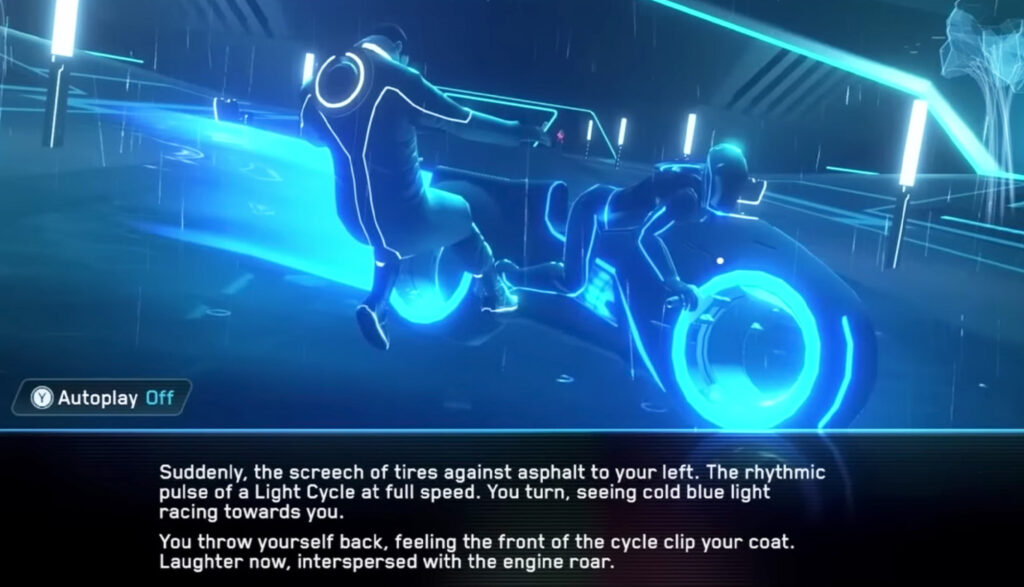
Fans of Disney’s computer grid world of TRON—introduced in the original 1981 film and revisited in 2010s TRON: Legacy—might spot this game and instantly think of a certain popular action arcade game. And indeed, like the TRON films and that 1982 game, we step into an inside-your-computer world filled with human-like binary constructs and cool neon-in-the-dark tones.
But if you’re expecting to man digital battle tanks or zip around on low-slung light cycles with the new TRON: Identity, you’ll find yourself disappointed. This TRON is something a bit different.
TRON: Identity casts gamers in the roll of Query, an emotionally detached and detective-like “Disciple of TRON” who’s sent to a Grid facility called the Repository. There was an explosion in the Repository’s central vault and important items or information may have been stolen.
Query is called in to question a small handful of programs who have lost parts of their memories in the blast. He must grill them for details, defrag their identity discs and, bit by bit, piece together the mysterious happenings on hand.
The game plays out as a neo-noir visual novel featuring mostly static image visuals with small, subtle animations. There are no voiced interactions, just typed-out dialogue entries underscored by a compelling soundtrack of ominous electronic music tracks. Players choose their dialogue entries from a list of possible choices and nudge the well-written story toward one of several possible outcomes.
In the midst of those interactions, Identity gives players a bit of mini-game challenge when they defrag an interviewees’ damaged identity/energy disc. That plays out as a somewhat simple puzzle game aimed at pairing numbers and card suits in an effort to clear away obstructions. It’s but a dash of gameplay in a text-heavy visual novel.
TRON: Identity is stylishly presented with very appealing visual images and a beat-heavy electronic underscore that feels right at home in the world of TRON. The mystery at this game’s core is cerebral and well-written, giving players an interesting look at the program characters of the Grid world.
Fans of previous TRON projects will note many interesting references and dialogue choices that tie this game to its source material. (That said, those who have never seen either of the two TRON movies may be at a bit of a loss at times.)
The game is rated T for its violence. But that violence consists of an explosion and a possible choice to attack a program and cause them to “derez” into digital bits. Nothing bloody. This game is also fairly short for the asking price. (That said, the many dialogue choices open the door to multiple “what if?” replays with different endings.)
Some of the programs look to the human creator of this Grid world (Kevin Flynn) as a godlike entity worthy of worship. Those “believer” programs speak of Fynn’s “grace” and use phrases such as “Flynn be thanked” and “Oh, users!” One program suggests that his office desk looks like a shrine and that “loyalty without faith (in Flynn) is a fickle thing.”
Though all of the other programs are referred to as “he” or “she,” one of the programs that Query must interview is presented as non-gender and appears both male and female. Others automatically recognize this program’s pronouns as “they, them.”
There are definitely data points of interest in TRON: Identity for TRON fans and noir mystery lovers. But if you’re looking for stylized gaming action and light cycles, this isn’t the code for you.

After spending more than two decades touring, directing, writing and producing for Christian theater and radio (most recently for Adventures in Odyssey, which he still contributes to), Bob joined the Plugged In staff to help us focus more heavily on video games. He is also one of our primary movie reviewers.